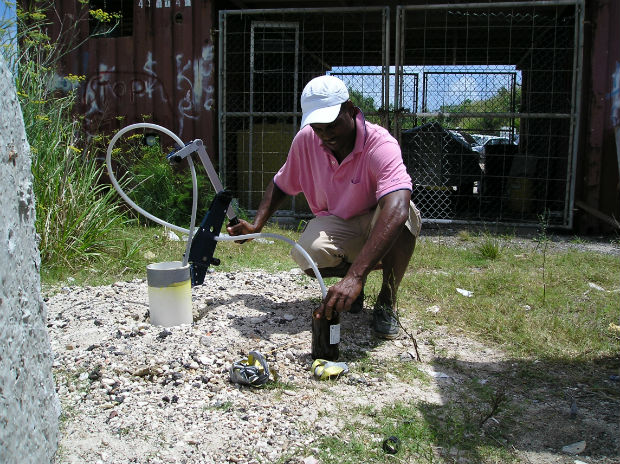Dr. Chapman began his PhD thesis in 2008 with the title of The role of renewable energy towards sustainable development in Small Island States: A Bermuda case study, focusing his attention on Bermuda and its place in the global push towards the use of renewable energy resources, finding that small island states are at an increased risk of facing sustainable development challenges regarding energy sustainability in comparison with larger continental urban areas.
His research included conducting more than 50 interviews with local residents, small and large businesses, the utility, and both government and non-government organizations, compiling and studying more than 150 questionnaire surveys, and quantitatively analyzing environmental data on local solar irradiation, wind, wave, and biomass resources.
According to Dr. Chapman, "Small Island States, particularly Small Island Developing States, are seen as particularly vulnerable in regards to development and sustainable development as it is seen internationally and historically as a strategy to address these vulnerabilities.
"In regards to issues relating to energy sustainability, renewable energy integration has been recommended as a sustainable development strategy towards achieving greater energy security for Small Island States, especially Small Island Developing States [SIDS], but also for more developed states like Bermuda."
"In 2006, Bermuda endorsed a strategy of renewable energy integration as part of its National Sustainable Development Strategy in regards to increasing energy security. Much effort was made towards developing Bermuda's National Sustainable Development Strategy through a comprehensive approach inclusive of public consultation and participation from a wide cross section of local stakeholders.
"However, there is some suggestion of hegemonic influences in the promotion of a global sustainable development agenda. This may be supported by the fact that, internationally, concepts of sustainable development, in particular those that encourage the uptake of renewable energy as an approach to solving environmental problems is one that has historically emanated from downward supra-national and international trajectories rather than upward indigenous ones.
"Indeed, in 2005, former Premier Alex Scott, who was responsible for initiating Bermuda's move towards the development of a national sustainable development strategy, cited meeting targets set in the Johannesburg Declaration on Sustainable Development adopted at the World Summit on Sustainable Development [Earth Summit 2002] as necessary to making Bermuda's own national sustainable development strategy "comprehensive."
"It was found that the role that renewable energy can play in Bermuda differs significantly than other Small Island States due to Bermuda's unique developmental profile. Unlike many other Small Island States which are classed as 'developing', Bermuda's high population density, high per capita GDP, and other factors indicating development such as intense energy use, high technology, and internet penetration and usage, universal education availability, and high literacy rates mean that Bermuda and other small islands such as Malta, Mauritius, and Singapore, need their own unique developmental category.
"As a result, islands like Bermuda with these types of developmental characteristics need to be assigned as being 'urban and developed' Small Island States, signifying a distinct developmental model differing from other small island counterparts designated as Small Island Developing States and where most of the past research on sustainable development has concentrated."

"In fact, urban and developed Small Island States like Bermuda are more likely to face sustainable development challenges regarding energy sustainability akin to larger continental urban cities rather than those endured by seemingly more geographically similar small islands like our Caribbean neighbours to the south.
"Although urban and developed Small Island States like Bermuda still share many of the same vulnerabilities in regards to energy like other islands, such as being vulnerable to reliance on energy importation, the existence of energy provider monopolies and suffering from very low diversity in energy production, the urban and developed characteristics of Bermuda mean that many of these vulnerabilities are exacerbated.
"For example, although all Small Island States are less adaptive to renewable energy integration due to inabilities to engage in technical energy infrastructural reform, Bermuda's urban and developed nature means that energy intensity is particularly high and the reliance on energy to maintain this development status quo means that unsustainable energy consumption based on fossil fuel dependency becomes 'locked-in'.
"Interestingly, this means that the urban and developed nature of Bermuda and the lock-in effect it creates acts more as a barrier rather than an incentive to renewable energy integration.
"Socio-economic status such as wealth and privilege was found to not only influence energy needs but also influence who might benefit from increased integration towards renewable energy. This means that more well-off residents are more likely to see financial benefits from the increased integration of renewable energy first."
Dr. Chapman is the author of the Daddy and I Explore children's book series
"Having said this, government- and utility-based financial incentives such as rebates and energy buy back schemes towards increasing the uptake of renewable energy would seem to benefit those who need it less from an economic point of view unless such programs are specifically tailored to provide opportunities for those less well-off to engage in renewable energy uptake.
"In reality, this suggests a far greater role of energy efficiency towards lowering vulnerabilities associated with energy sustainability and possibly an area where more national focus should be placed on rather than on encouraging renewable energy integration alone.
"In the business arena, socio-economic factors again proved influential on the role that renewable energy might play to these stakeholders. For large businesses, it was high salary costs associated with labour and staffing that were seen to be more important concerns than energy costs.
"For small business owners, issues regarding energy rarely featured as an isolated core business concern as most did not own their own premises and energy costs were included as part of overall facility rental charges."
Dr. Chapman hopes to provide more detail on his research at an upcoming invitation to the Bermuda College's 2015 Corange Science event.
Dr David Chapman - Local Media Coverage

